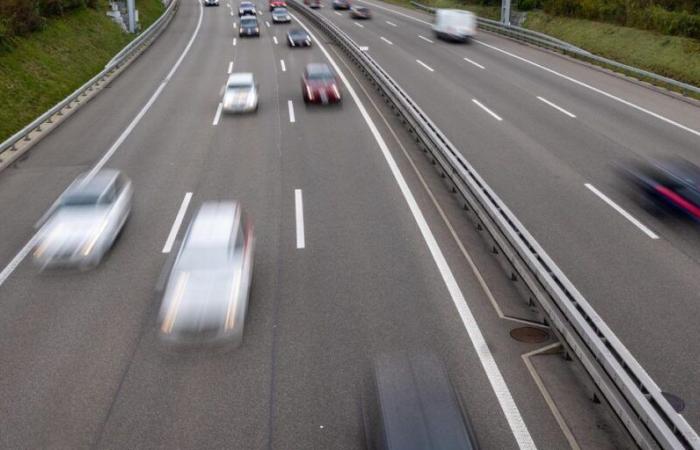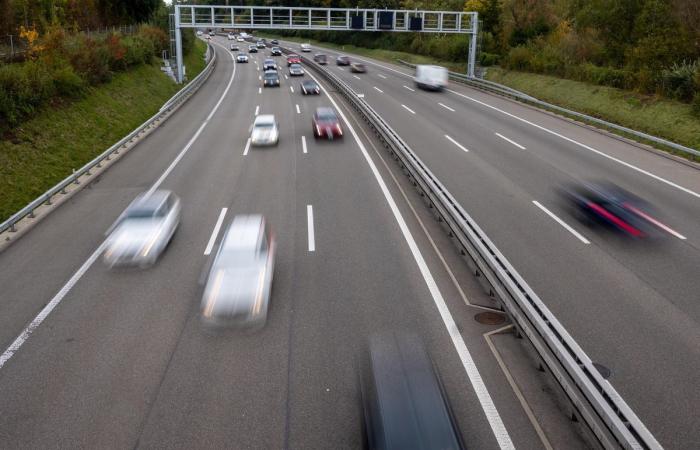Voting survey 2nd wave –
Motorway proposal is losing massive support – nervousness among supporters is growing
The vote on November 24th will be a nail-biter. Yes and no proportions are getting closer, especially when it comes to motorway expansion. When it comes to Efas, many are still undecided.
Published today at 6:00 am

Approval for motorway expansion fell from 56 to 49 percent between the first and second waves.
Photo: Sabina Bobst
Subscribe now and benefit from the read-aloud function.
BotTalk
- Approval for motorway expansion fell from 56 to 49 percent.
- Young people and city dwellers in particular are increasingly rejecting the expansion.
- Support has increased for the Efas health bill and decreased for the tenancy law bill.
The support for the Highway expansion crumbles noticeably. According to the latest survey by “20 Minutes” and Tamedia, the approval is there since the first wave of surveys at the beginning of October decreased from 56 to 49 percent. Such a decline of seven percentage points is unusual for a proposal from the Federal Council and Parliament.
The current survey trend now points to a neck-and-neck race: 49 percent yes versus 48 percent no. The expansion is met with resistance, particularly in the cities and among younger people, while the rural population more clearly approves of the proposal.
According to the survey, opponents of motorway expansion rely primarily on the traffic argument: 50 percent of those opposed are convinced that more roads lead to more traffic. Experience and traffic research have shown that congestion would only decrease in the short term if the expansion were to take place.
For a quarter of opponents, climate protection is the priority – the expansion contradicts the climate goals that could be achieved if car traffic is curbed.
The party preferences for motorway expansion show the classic left-right divide: the bourgeois parties clearly support the proposal – especially the FDP and the SVP. The majority of the center base also supports the expansion.
On the other hand, there is a clear no from the left-green camp: the Greens reject the proposal with 93 percent, the SP base with 78 percent. The GLP supporters are also clearly in the negative camp with 61 percent no.
Trade association hires PR agency
The nervousness in the proponent camp has been growing ever since SRG survey from mid-Octoberwhich at that time only had a narrow majority of 51 percent.
The trade association, which is leading the voting campaign, hired a consultant from Dynamics Group, an external PR agency. This is despite the fact that the trade association’s office would actually be well positioned with eight people in the communications department.
The Federal Roads Office had previously made headlines because it hired several communications agencies to present the expansion of the motorways in a positive way. as “SonntagsBlick” reported.
The Infrakom agency alone was given a budget of 250,000 francs to organize events and exhibitions related to the planned Rhine Tunnel. In addition, it should subject all media inquiries to a “philosophy check,” as it says in the paper on the communications mandate.
Yes trend in the health bill
The second proposal, which comes from the Federal Council and Parliament, is developing in the opposite direction to the trend in motorway expansion: The Uniform financing of outpatient and inpatient services (Efas) has gained approval.
While the yes and no votes were balanced in the first wave of the survey, the picture has now changed: 46 percent would accept the proposal and 44 percent would reject it.
What is particularly striking, however, is that at 10 percent, the proportion of undecided people is still unusually high. This leaves the exit open.
Political scientist Lucas Leemann, who is responsible for the survey with the Leewas Institute, attributes the still large number of undecided people to the fact that this issue has been political from the start “Cacophony” prevailed: In the case of the SVP, the parliamentary group was for it, the party leadership was against it and the assembly of delegates was again for it; At the SP, the presidium members Cédric Wermuth and Mattea Meyer voted oppositely on the issue in parliament.
The party-political divides are also striking in the Efas template: While the FDP and GLP clearly support the reform, the SP and the Greens just as clearly reject it. There is also a striking difference between urban and rural areas and according to income: the higher the income, the greater the approval.
No trend in tenancy law templates
Both tenancy law templates have lost support since the first wave of surveys. The tightening of the rules for subletting was originally rejected by 47 percent. Now 51 percent are against it.
Skepticism is particularly high in cities: only 37 percent would agree, while in rural areas the proposal still has a majority of 54 percent.
Proponents argue that the change in the law prevents excessive subletting prices on rental platforms, for example. Opponents consider the proposal to be unnecessary, as subletting that is too high is already prohibited.
There is a downward trend in the personal use template: support has fallen from 43 to 41 percent. Here, too, there is a pronounced urban-rural divide and a clear income dependency.
While people with a household income of over 16,000 francs support the proposal at 66 percent, people with an income under 4,000 francs reject it at 64 percent. Opponents primarily fear dismissals under the pretext of personal needs.
The survey was conducted by the company Leewas. Between November 6th and 7th, 2024, 11,961 people from all parts of the country took part. The statistical error range is ±1.6 percentage points. When analyzing characteristics such as party affiliation or language region, the statistical uncertainty is greater due to the smaller number of cases.
The morning
The perfect start to the day with news and stories from Switzerland and the world.
More newsletters
Log in
Edgar Schuler is a domestic editor with a focus on politics and regularly writes the newsletter “Der Morgen”.More info
Found an error? Report now.
0 comments








